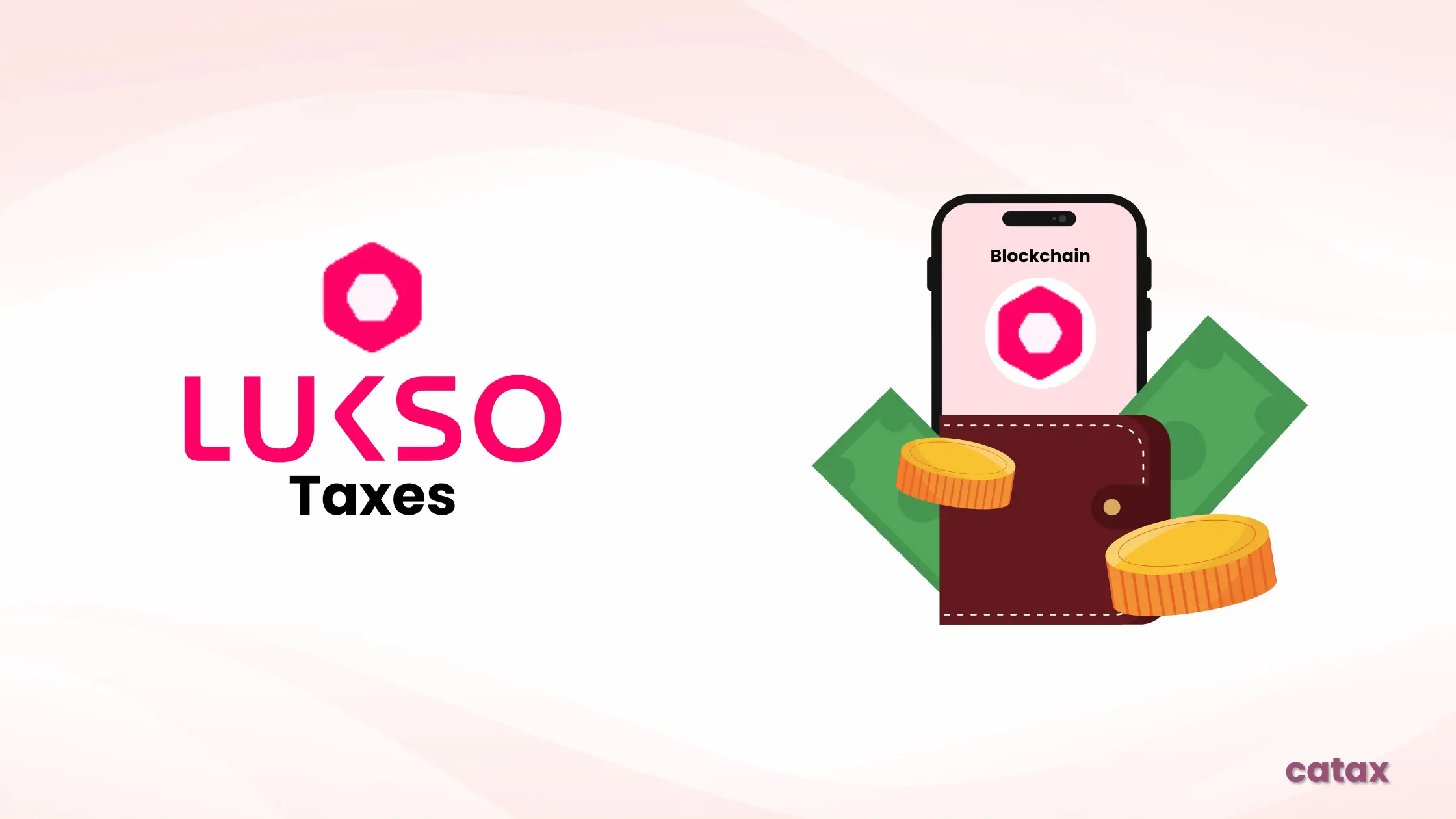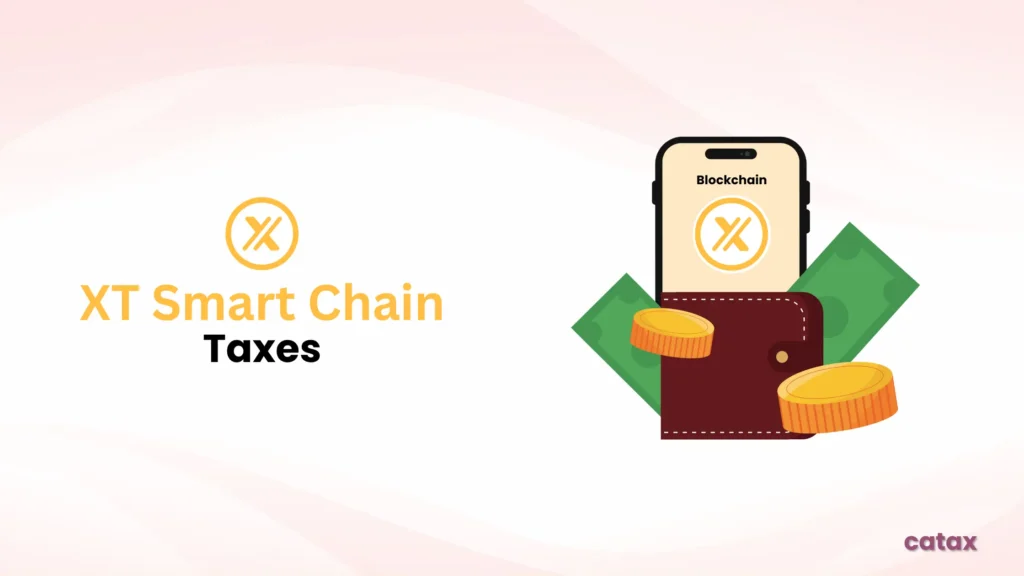Cryptocurrency tax regulations are different across the globe, and Taxes for Lukso (LYX) is no different. Depending on the jurisdiction you are in, whether you are buying, selling, trading or staking Lukso, you may incur tax liabilities. Not understanding how your local tax authority treats crypto activities can put you at risk of non-compliance and unexpected tax penalties.
This guide will take you through every single aspect of how Lukso is taxed in simple, easy-to-digest language.

- How to Connect Your Lukso Wallet to Catax
- Are Lukso (LYX) Transactions Taxable?
- Can You Deduct Trading Fees and Other Costs?
- How Is Lukso (LYX) Taxed Based on Holding Time?
- How Is Staking Income from Lukso Taxed?
- Can You Use Lukso Losses to Lower Your Taxes?
- How to Stay Compliant with Lukso (LYX) Tax Regulations
How to Connect Your Lukso Wallet to Catax
To accurately monitor your Lukso transactions and figure out your taxes, you can easily connect your wallet to Catax. It’s that simple, they do it for you.
- Open your Lukso wallet or block explorer (MetaMask, Trust Wallet, Ledger, etc.)
- Get your public wallet address and copy it.
On Catax:
- Log in to Catax and select your country.
- Choose Chain and then search for Lukso Wallet.
- Paste your public address and click Connect.
Catax will now sync your transactions automatically and help you calculate your tax obligations in real-time.
Calculate My Taxes ➤Are Lukso (LYX) Transactions Taxable?
Yes, the majority of countries view transactions that use cryptocurrency as taxable. The category of taxes you will incur from Lukso transactions depends on how you are using LYX.
- Selling LYX for profit – If you sell Lukso at a higher price than you paid for it, that profit is considered taxable as a capital gain.
- Swapping LYX for other coins – This is generally seen as a taxable event even if you didn’t cash out to fiat.
- Paying with LYX for goods/services – If the value of lukso has increased from the time you purchased it, using it to pay for something could trigger a capital gains tax.
- Earning LYX from staking – Staking rewards are taxed as income in many places, as soon as you earn them.
- Getting paid in LYX – If you are paid by someone in Lukso for a good or service, this is considered taxable income based on the value of LYX at that moment.
Crypto tax rules can vary from country-to-country, so it would be best to check your local rules or apply a tool like Catax that applies the proper rules based on your location.
Can You Deduct Trading Fees and Other Costs?
This is a popular question from Lukso users, and the answer depends on what the tax laws in your country state. Some countries allow tax deductions for expenses related to your crypto transactions such as:
- Exchange fees charged when you buy or sell LYX.
- The network fees you pay when transferring LYX between wallets.
However, every country doesn’t offer all of these deductions. Some countries restrict costs to the purchase price (cost basis) and don’t allow other fees to be deducted. You should check local guidelines or consult a tax professional for confirmation.
You can also check out our Country-Specific Guide for Crypto in Your country. This guide provides insights on regulations, tax implications, and compliance measures breifly explained for each country.
How Is Lukso (LYX) Taxed Based on Holding Time?
The taxation on gains from Lukso will depend on how long you held the tokens:
- Short-term holdings: If you sold your LYX within a year of purchasing it, then you may have to pay higher tax rates, similar to income tax rates.
- Long-term holdings: If you held your LYX for longer than a year, many countries have lower rates available for long-term capital gains.
- Flat rate countries: Some countries will have the same tax rate for all holding periods no matter how long you held your crypto.
Understanding how your country understands holding periods for crypto can help you decide when is the best to sell to minimize taxes.
How Is Staking Income from Lukso Taxed?
Depending on your country, staking Lukso can receive some tax treatment, if and when you receive rewards. In general, there are two ways countries can treat staking income:
Taxed as income: Some countries will tax the rewards for staking as soon as you accept them. This means you will need to report the staking rewards as part of your annual income.
Taxed as capital gains: Other countries will wait until you sell or exchange the staking rewards. At that point, you will pay tax on any profit.
It’s important to know how your country handles staking so you can report it correctly. If staking rewards are taxed as income, you may owe taxes even if you haven’t sold those rewards yet.
Can You Use Lukso Losses to Lower Your Taxes?
Yes, in several countries, if you sell LYX for less than your purchase price, you can apply that loss to lower your taxes. Below are some of the common ways losses are treated:
- Offset Gains: You can use your losses from Lukso to offset profits from other cryptocurrencies or even stocks.
- Carrying forward losses: In some countries, if you don’t have gains in the year of the loss, you can use it to offset gains in future years.
- No deductions: There are a few countries that have no offsetting for any losses for crypto, so make sure you check the rules in your area.
Make sure to keep good records of all of your transactions if you need to substantiate your losses.
How to Stay Compliant with Lukso (LYX) Tax Regulations
As governments are becoming more stringent regarding crypto taxes it is increasingly important to play by the rules and to be current. Here are some things to do in order to stay compliant:
- Learn how your country taxes Lukso: Is it classified as income, capital gains, or business income?
- Understand what costs you can deduct: Understand if trading fees, staking rewards, and safety cost are deductible.
- Keep accurate records: Keep track of each Lukso transaction (buy, sell, trade, stake, and spend).
- Use a crypto tax calculator: A platform like Catax allows you to calculate and file your tax returns correctly.
- Talk to a tax professional: If you have any doubt about any aspect of tax, it’s a great idea to consult a tax advisor who is familiar with crypto laws in your country.


